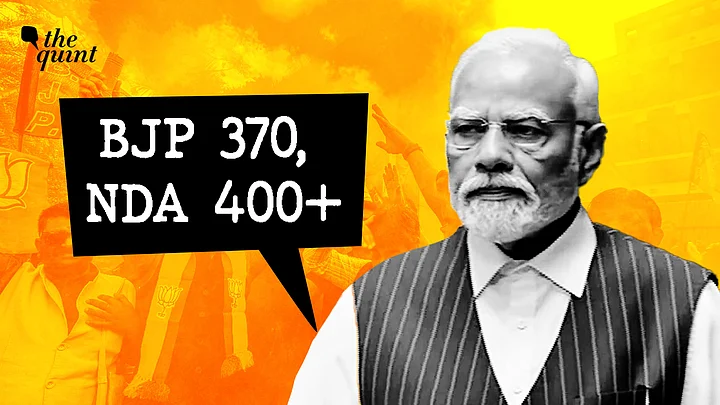Prime Minister Narendra Modi made a bold prediction earlier this week during his last address to the Lok Sabha, that the Bharatiya Janata Party (BJP) will secure 370 seats and will cross 400 with its allies in the 2024 general elections.
Is this another sweeping claim or does it hold any merit? This also inadvertently begs the question: is it even realistically possible to attain such a huge mark?
In his reply to the discussion on the Motion of Thanks on the President's address in Parliament, the PM claimed confidently, "Our third term is not far away and it will be one of [the] big decisions."
Things, however, may just be in Modi's favour – a weakened Opposition, the INDIA bloc's failure to take off, an environment resounding with Ram in the Hindi heartland, and the ghar waapsi of Nitish Kumar to the NDA (National Democratic Alliance) bloc to name a few.
Does Modi's 'Big Claim' Add Up?
But the fact that Modi restricted BJP’s tally to 370 and not 400 hints at the sheer enormity of the task.
The only time a party crossed 400 seats was in 1984 when the Congress won 404, riding the sympathy wave in the aftermath of the assassination of Indira Gandhi.
Elections in Assam and Punjab were held a year later due to disturbances in these states where the party won another 10 seats, taking its tally to 414. Incidentally, the Congress had also recorded its highest vote share of 48.1% in the same year.
In the 2019 elections, the BJP contested 435 seats. The exodus of allies in Punjab and Tamil Nadu could force it to contest another 25-35 odd seats. However, from these states, it is unlikely to win many of these.
The party was a runner-up in 31 seats in 2019. Only in one seat in Odisha did it lose by a margin of less than 5%, but in the other seats, it lost out badly. 14 of these seats are in Kerala where the main contest is between the CPM-led Left Democratic Front (LDF) and the Congress-led United Democratic Fund (UDF). So, not much scope can be seen there as well.
Eight of these seats are in Telangana where the Congress has formed a government recently. The party hopes it could benefit from the weakening of the Bharat Rashtra Samithi (BRS), but the fact that it's a national election could very well make it a Congress vs BJP contest. At best, it could emerge as a runner-up as the loss margins are huge.
So if the NDA crosses 400 seats, it would equal the Congress' record in 1984, which was in many ways an outlier of an election.
Areas of Improvement for the BJP in Terms of Seats
In 2019, the BJP won 155/191 seats in the north, 67/142 in the east, 30/132 in the south, and 51/78 in the west. The scope to further improve in North India remains.
For example, in Uttar Pradesh, it can add 16 seats (excluding allies) if it wins 80/80 seats due to the Ram Mandir fervour and a slackened Opposition, even the Samajwadi Party-Congress alliance is not frozen yet and the BSP is out as of now.
Now coming to the target figures,
For the BJP to win 370 seats, it would need to sweep North, West, and East of India, which in total account for 411 seats, and Karnataka (the only state in South India where it has a good track record) which has 28 seats. That is 439 seats. Out of these 439 seats (411+28), allies like the NCP, the SHS, the JDU, the LJP, and the Apna Dal are likely to contest around 40 seats.
So the BJP which is expected to contest 400 of these seats needs a very high strike rate of 92.5%.
This amounts to the fact that the BJP would need to sweep West Bengal and Odisha from where it has 26 MPs out of 63 and here it faces competition from strong regional players like the Trinamool Congress (TMC) and the Biju Janata Dal (BJD).
What Makes the BJP and PM Modi So Confident?
However improbable the chances may seem otherwise, it is well established that nothing is practically 'impossible' in politics. After all, there was a 3-0 scoreline against the Congress in recent state polls in the Hindi heartland where pundits predicted the Congress party to do well.
But the BJP has its fair share of challenges for Mission 370/400 which broadly are:
Achieving a very high strike rate
Natural anti-incumbency against MPs
Overdependence on PM Modi
Inflation, unemployment, poverty, and agricultural distress are issues that could impact voting behavior (even though not witnessed in recent state polls)
On top of that, any black swan event that undermines the PM's popularity in the next two months could pose risks to the BJP’s mission.
(The author is an independent political commentator and can be reached at @politicalbaaba. This is an opinion piece. The views expressed above are the author’s own. The Quint neither endorses nor is responsible for them.)
